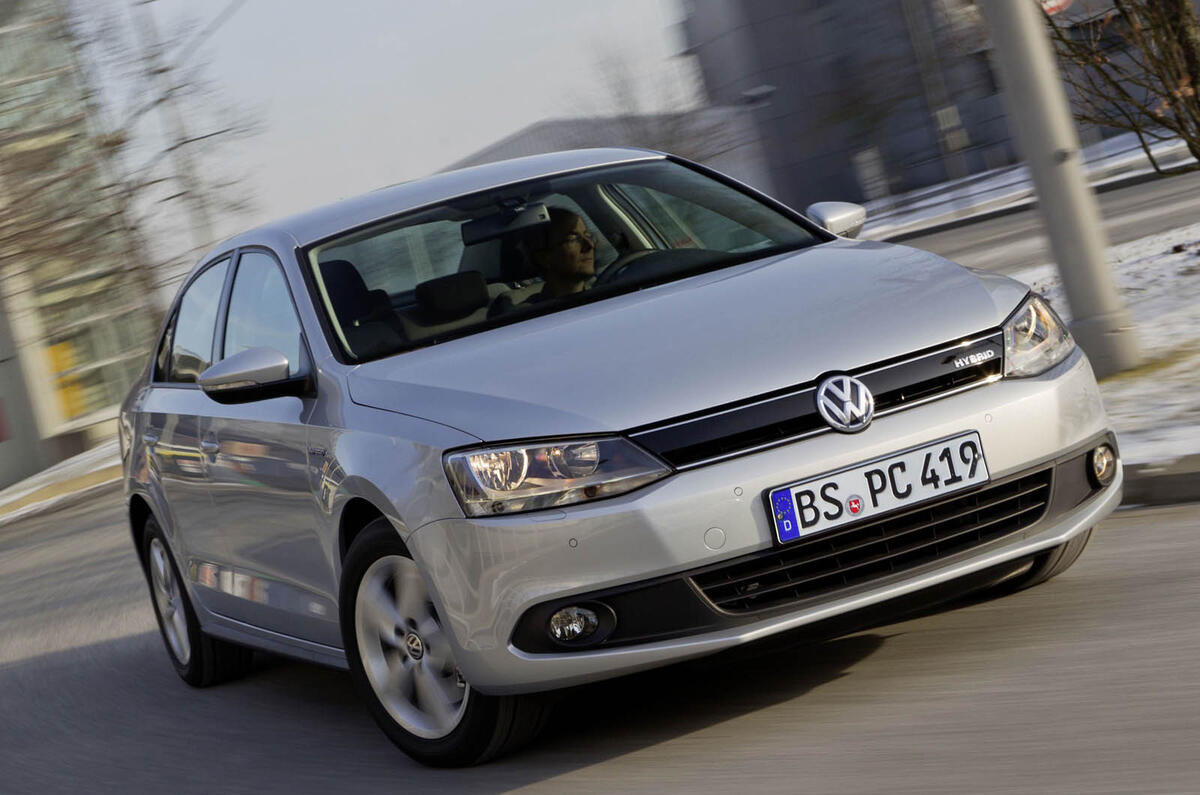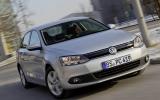What is it?
This is the new VW Jetta Hybrid, built at the company’s Chattanooga plant in the US. It’s a fairly simple layout under the skin: primary power comes from the familiar 1.4-litre turbocharged petrol engine (boosted here to 148bhp) driving a seven-speed DSG transmission. Sandwiched between the engine and gearbox is a compact 27bhp electric motor. The car weighs just 221lbs more than the standard Jetta.
The electric motor is backed up by a Lithium-Ion battery, though one of just 1.1kWh capacity. The motor has the poke to propel the VW Jetta Hybrid up to 44mph on the battery alone. At more modest speeds, this battery can only power the car for around 1.2 miles with the engine switched off.
However, by using this modest battery to get the car moving from a standstill and by deploying a clutch that isolates the engine from the drivetrain during coasting and running pure electric modes, this Jetta has been rated as averaging a diesel-like 54mpg (45mpg in US gallons) across the four different fuel economy tests used by the American authorities.
What’s it like?
Remarkably normal. Unlike the Toyota Prius, which is undermined by its droning CVT box and remarkably wooden ride and handling, the VW Jetta Hybrid feels like a typical medium-size VW saloon. Indeed, in normal driving conditions, there’s not much to distinguish between it and the Skoda Octavia 1.4 TSi, even though it lacks the Skoda’s more sophisticated rear suspension.
It is brisk, rides decently and benefits from the sweet downsized petrol engine and the now-familiar stop-start engine management. From a practical point of view, the car offers impressive rear legroom and a decent boot and is very nicely put together.
It is hard to tell that this is hybrid, aside from the fact that car rolls away from traffic lights in silence (assuming the battery is charged).
VW says that its technique for regenerative braking is different to other makers’ hybrid systems. When the driver lifts off before braking, a clutch disengages the engine from the drivetrain, so the slowing is achieved by the brakes, rather than also using the drivetrain drag and electric motor.
Aside from, according to VW, recycling more energy back into the battery, from a driver’s point of view, the way the car can be slowed feels much more natural and progressive than is often the case with a hybrid.
Should I buy one?
The Jetta Hybrid goes on sale later this year. There is one significant thing to remember about the Jetta Hybrid, which is that is based on VW’s current technology to a great degree. The platform is a mixture of today’s PQ35 Golf structure and other modules and the 1.4 TSi engine is the current unit, not the all-new (and 8-10 per cent more efficient) unit destined for the new Golf family.
In reality, the Jetta Hybrid is aimed at the US buyers for whom the term ‘hybrid’ equates to ‘virtuous’. European buyers will, surely, stick with the diesel Jetta, which will be cheaper and deliver slightly better economy. Better still, wait for a new-generation Golf family model in 2013.
But if you are one of Europe’s potential hybrid buyers, this car may not flaunt its difference in the way that the Prius does, but it does feel virtually indistinguishable from its petrol sibling and, therefore, is more appealing driving proposition than the Toyota.









Join the debate
Add your comment
Re: Volkswagen Jetta Hybrid
I agree. I think that a Golf Hybrid would be quite appealing to quite a few customers.
I guess VW are targeting the US initially, but I don't think it will be too long before the Golf variant follows...
Re: Volkswagen Jetta Hybrid
The Jag does about 10 to 12 mpg locally, it will do 18 on a good run. It doesnt go that far though! The Pug is a brilliant car, The MI16 has a great mix of handling and ride, and its performance is decent even now. One day i will replace the Honda (but i am in no hurry) but the Pug is staying, as is the Jag and Vauxhall
Re: Volkswagen Jetta Hybrid
Can I ask. How much mileage does the Jag get? And why do you keep the Pug?